U.S. Sen. Jeff Bingaman’s announcement that he’s retiring tops the list, but 2011 will also be remembered for lots of scandal and corruption, some interesting dynamics in the Roundhouse, and the rise of the Occupy movement
Without further ado, here’s my list of the top 10 New Mexico political stories of 2011. Feedback? Submit a comment at the end of the article.
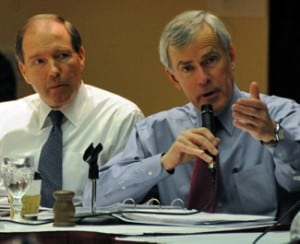
U.S. Sen. Jeff Bingaman, right, with Sen. Tom Udall, who will replace him as the state's senior senator (Photo by Heath Haussamen)
1. Bingaman’s retirement
When he announced in February that he is retiring at the end of 2012, U.S Sen. Jeff Bingaman gave this explanation:
“At some point in any one of these jobs, you come to a point where you think you’ve made your best effort, and it’s time to move on and allow someone else to serve. That’s the point I’ve arrived at.”
For a senator who generally kept a lower national profile than his colleagues and spent more time on policy than politics, that quote revealed something profound: Bingaman spent nearly three decades in the circus that is Washington and somehow retained his humility.
Others will talk about New Mexico’s loss of seniority in the U.S. Senate with the retirements of Pete Domenici in 2008 and Bingaman next year. That’s a fair point. In fact, it’s what makes Bingaman’s retirement the top New Mexico political story of 2011. During the 110th Congress, the two were the longest-serving duo in the U.S. Senate. They were the chair and ranking member of the Senate Energy Committee and had a dramatic impact on national energy policy. They protected New Mexico’s military installations and national laboratories.
Bingaman worked successfully on other issues including conservation, immigration, and health care. He was one of the “gang of six” who worked toward compromise on health-care reform in 2009.
With Bingaman’s retirement, New Mexico will shift to having one of the shortest-serving duos in the Senate – Tom Udall and whoever wins next year’s race to replace Bingaman. But Udall spent a decade in the U.S. House before moving over to the Senate, so he’s not exactly a young’un.
The battle to replace Bingaman in the Senate will be one of the top New Mexico political stories of 2012. U.S. Rep. Martin Heinrich is giving up his House seat to run for Senate, and state Auditor Hector Balderas is running against him. Former U.S. Rep. Heather Wilson is the frontrunner for the GOP Senate nomination, but Lt. Gov. John Sanchez and Las Cruces businessman Greg Sowards are also in the mix. There are three-way primaries on both sides in the race to replace Heinrich in the House. Bingaman’s retirement creates opportunity and uncertainty in state politics.
But that’s one of next year’s top stories. For now, I’ll leave you with Bingaman’s quote about the delegation he’s leaving:
“I think we have a very capable congressional delegation, and I’m confident they can carry on.”
Simple. Kind. Unassuming. It’s exactly what you’d expect from Bingaman at the end of his career in the Senate. Whether he will admit it or not, his has been a career that made a real difference. Well done, senator. Thanks for your service.
2. Uncertain dynamics in the Roundhouse

Gov. Susana Martinez
Republicans had more influence in the Roundhouse in 2011 than they’ve had in more than eight decades. In addition to Gov. Susana Martinez taking office, the state had its first GOP secretary of state and a greater percentage of Republicans in the House than it has had in more than 80 years.
The result was largely gridlock. At the top of the list of issues on which policymakers are at a stalemate is Martinez’s push to repeal a law that allows undocumented immigrants to obtain driver’s licenses and Secretary of State Dianna Duran’s proposal to implement a voter ID law. The Legislature also quit a special session having given up hope of finding compromise on redistricting and leaving the task to the courts.
But it wasn’t just the GOP gains that led to the gridlock. Rep. Joseph Cervantes’ attempt to unseat House Speaker Ben Luján at the end of 2010 was unsuccessful, but it still weakened Luján’s power. Then came Andy Nuñez’s switch from Democrat to independent after his party refused to support Cervantes. Add to that a surprising independent streak in Democratic Rep. Sandra Jeff, and the House is nearly evenly split and entirely unpredictable.
To make things even more difficult in Santa Fe, Martinez seems to have picked up where former Gov. Bill Richardson left off as far as the executive’s relationship with the Senate – which is to say that the relationship is almost non-existent. The Senate is determined to protect its power and is oversensitive to any attempt by the executive to encroach on its authority. Martinez has little patience for those who don’t get on board with her agenda.
Meanwhile, the governor has won a few legislative victories, including implementing the assigning of letter grades to schools. But she certainly hasn’t gotten things done as quickly as she’d hoped.
As 2011 comes to an end and lawmakers prepare to gather in Santa Fe in mid-January, everyone is still trying to figure out how things are going to work. Time will tell, but 2012 promises to be interesting in Santa Fe.
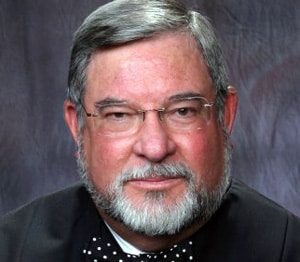
District Judge Mike Murphy
3. Judicial scandal
In spite of early statements in the bribery case against District Judge Mike Murphy, prosecutors have produced no proof of widespread bribery in the judiciary. In fact, Murphy isn’t even charged with paying a bribe. His May indictment on four felony charges is based on allegations that he solicited a bribe from potential judicial applicant Beverly Singleman, told Judge Lisa Schultz to tell Singleman she needed to pay the bribe, and threatened to destroy Singleman’s reputation for telling others that he solicited a bribe from her.
Separate from that indictment, Murphy faces another felony charge for allegedly offering “several promises” to Schultz in December 2010 if she would agree to be the tie-breaking vote to make Douglas R. Driggers the chief district judge in Las Cruces.
But perhaps the most interesting aspect of the case may be all the other judges who knew about Murphy’s big mouth – his alleged statements that are the basis for the charges against him – and did little or nothing about it.
As I wrote in a May commentary, judges and lawyers are required to report potential violations of the Code of Judicial Conduct to the state’s Judicial Standards Commission. From that commentary:
“And yet, according to witness statements, Murphy told several other judges and lawyers that he made some sort of payment – possibly a campaign contribution – in exchange for his appointment to the bench, and that other judicial applicants had to do the same to get appointed.”
But who was there to stop him? Judge Lisa Schultz claims she sought advice from several other judges, including a Supreme Court justice, about what to do, but she received little help until she took the allegations against Murphy to law enforcement.
The judiciary has learned to take certain problems seriously in the years since then-District Judge John Brennan was arrested in Albuquerque in 2004 for drunken driving and cocaine possession. That incident led to a reshaping of the state’s judiciary, and Appeals Court Judge Roderick T. Kennedy wrote a column this year about help that’s available for judges who are in trouble.
In 2011, a DWI ended Appeals Court Judge Robert E. Robles’ career, and District Judge Albert S. “Pat” Murdoch quit after being charged with raping a prostitute (the case against him has been dropped for now but could be refilled).
But the tolerance for Murphy’s big mouth reveals another serious issue. When asked about it during an interview for the judgeship in 2006, Murphy promised to keep his mouth in check and was given a pass. He broke that promise repeatedly with his claims about how he got his job (and his offensive comments about gay people). The ensuing scandal – one of the worst in the history of the state’s judiciary – illustrates why his colleagues needed to report him.
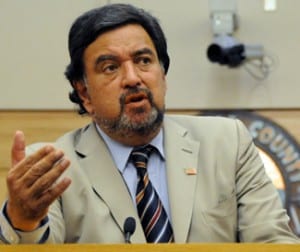
Heath Haussamen / NMPolitics.net
Former Gov. Bill Richardson (Photo by Heath Haussamen)
4. Another Richardson investigation
Former Gov. Bill Richardson left office at the end of 2010 but didn’t stay out of the news. A federal grand jury is currently investigating an accusation that Richardson had supporters pay a woman $250,000 to keep quiet about their alleged extramarital affair while he was running for president. The details have trickled out. Read about them here, here and here.
Will Richardson or anyone close to him be indicted? Personally, I’ll believe it when I see it. This is at least the fourth time a grand jury has investigated Richardson since 2008. Two probes ended without indictments. A third into state investments is pending, as is this newest investigation.
The longer Richardson stays in the news because of criminal investigations, the more likely it becomes that history will remember him as corrupt, regardless of whether he is ever charged with or convicted of any crime.
Richardson’s only comment on the probe thus far? “Merry Christmas.”
5. Jerome Block Jr. convicted, resigns
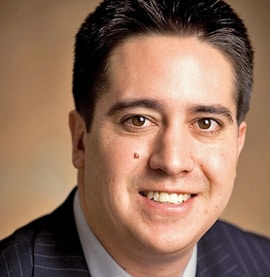
Former Public Regulation Commissioner Jerome Block Jr.
Those who were paying attention should have known even before he was elected in 2008 that Jerome Block Jr. had no business becoming a member of the Public Regulation Commission.
Regardless, it was simply sad when Block’s career as a public official began to unravel in August and his addiction to a prescription drug was revealed. As the House began moving forward with impeachment, Block entered into a plea bargain with the attorney general on a number of charges stemming from several cases, and he resigned.
Gov. Susana Martinez, a Republican, replaced the Democrat Block with independent Doug Howe.
The AG’s deal let Block avoid prison if he completed a drug-treatment program, but Block has violated the terms of that agreement more than once and ends the year with an upcoming sentencing date and the AG seeking the maximum of 4.5 years in prison.
The question of how Block obtained drugs remains unanswered. There appears to be a law enforcement probe into some questionable e-mails Block sent that might have referenced drugs.
6. Columbus firearms smuggling case
This case didn’t receive as much media attention as those involving Block or Richardson, but it’s arguably much more serious. Here’s how I summed it up in an August column:
“New Mexico has seen lots of government corruption exposed in recent years that involves stealing money from taxpayers. But the recent weapons-smuggling case involving Columbus village officials takes government corruption to a more egregious level.
“The (now former) mayor, police chief and a city councilor were involved in a ring that helped smuggle firearms to the La Linea cartel in Mexico and also provided it with ammunition and tactical gear.
“In other words, public officials in a tiny border town in New Mexico used their jobs to help arm a cartel in Mexico, where the drug war and other lawlessness have claimed tens of thousands of lives in recent years.
“Is it a stretch to say that former Columbus Mayor Eddie Espinoza, Trustee Blas Gutierrez and Police Chief Angelo Vega enabled the killing of people in Mexico? I think not.”

An Occupy Las Cruces protester (Photo by Heath Haussamen)
7. Occupy movement
In the fall, the Occupy movement stormed Las Cruces, the rest of New Mexico, and the nation. Occupy has already had a tangible impact by forcing Bank of America and other financial institutions to back off new fees. People are protesting, boycotting, camping in public places, and in some instances clashing with police (or having police clash with them).
The movement has added another dimension to the conversation about America’s future. Budget cuts are no longer the only solution being seriously discussed.
But will Occupy have a lasting impact? The 2012 election will be telling. In the meantime, I have been asking people involved in the movement to share what they believe it’s about. You can read some of their thoughts here, here and here. And you can read this news article from a reporter who visited the original Occupy movement in New York City to try to make sense of it.
8. Duran’s voter fraud probe
Dianna Duran, the first Republican secretary of state in more than 80 years, grabbed headlines in 2011 for claiming that she had uncovered evidence of foreign nationals illegally voting in elections. But in the end, all we had was what I called a “snarky report we can’t trust.” Here’s how I summed it up:
“Duran had the opportunity, coming off her impressive and bipartisan election, to unite elections officials from both parties behind a compromise to improve election integrity and make it difficult for the naysayers in the Legislature to win the day.
“Instead, Duran has hidden evidence from county clerks and the public, attempted to deflect criticism onto the Democratic AG, taken shots at a Democratic county clerk, and, in her report, taken a tone that seems to be more about winning an argument than finding solutions.
“That’s the most unfortunate part. Though technology has helped clerks and the secretary of state make dramatic improvements to New Mexico’s voter rolls in the last 10-15 years, it’s clear there are still problems with the system. We need solutions.
“We needed Duran to lead a transparent investigation that included the county clerks – from both parties – throughout the entire process, so we could know there was evidence to back up the conclusions and that partisanship wasn’t an issue. We needed Duran to unite our state’s elections officials behind solutions so lawmakers would be pressured into acting.
“We didn’t need a snarky report we can’t trust.
“What a wasted opportunity.”
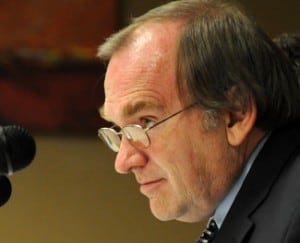
Attorney General Gary King (Photo by Heath Haussamen)
9. Criticism of Gary King
Attorney General Gary King had one of the worst years of any elected official in New Mexico in 2011. The criticism was widespread (and included me), and it covered a range of issues including allegations that his office was “ineffective” in dealing with cop discipline cases, that it trailed those responsible for Medicaid fraud recovery in almost all other states, that he thumbed his nose at campaign contribution limits, that he gave Jerome Block Jr. an overly lenient plea deal, that he was playing fast and loose with Southern New Mexico’s water, that he declined to investigate bribery allegations against a state official the feds later indicted, that his office violated the Inspection of Public Records Act, and that he had a serious conflict with a corruption case his office was prosecuting.
King has long faced criticism for his handling of corruption cases, but the condemnation of the job he’s doing was deafening in 2011. The Santa Fe New Mexican said King should consider resigning. I slammed King after he attempted to damage my credibility and intimidate me into silence by suggesting that I colluded with Republicans to deflect criticism away from the governor and onto him.
If King doesn’t change some things, the criticism will continue.
10. Redistricting
Here’s what I wrote earlier this year about the Legislature’s futile attempts to settle the issue of redistricting:
“Elected officials generally seek to preserve their own seats, even when it no longer makes sense. Groups with power seek to protect it. To top it all off, we’re living in one of the more partisan times in American history. This fight was destined to end in a stalemate.”
Fortunately, we have courts to decide things for us when our elected officials in the legislative and executive branches don’t get the job done. But does anyone think that’s an ideal situation? It costs millions of dollars and doesn’t seem all that democratic.
When she was a candidate for governor, Susana Martinez told NMPolitics.net she supports the creation of an independent redistricting commission to take the politics out of the process. What a fine idea. Let’s hope she starts actively pushing for the formation of such a body.